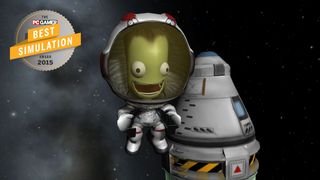
Kerbal Space Program, aside from being one of our favorite games ever, wins our 2015 award for Best Simulation. The team discusses what makes KSP so monumental below. We'll be posting the rest of our awards and personal picks daily as we approach the end of the year, which we're collecting on our main GOTY page.
Phil Savage: Part physics sandbox; part management sim; part soaring love letter to one of mankind's greatest achievements. In Kerbal Space Program, you build rockets and send little green astronauts into space. That's the aim, but Kerbal makes you work for it. The underlying game design is based on the real-world principles of gravity, mass and thrust. It's ridiculously complex if you're targeting peak efficiency, but, as it turns out, you can simply brute force a solution by adding more rockets. Kerbal's great trick is that it's an educational game that doesn't explain anything. You learn by doing, building a working knowledge of its systems—and thus, the actual, real-world considerations required to send things into space—over countless hours of entertaining failure, revision and success. It's fun to watch your craft buckle and collapse during a maiden voyage, and it arms you with the knowledge necessary to go back to the drawing board and try again.
If we gave awards to Early Access games, KSP could have been a contender over any of the last few years. It started well, and only grew better with subsequent patches. Now, despite technically having been released this year, it enjoys the benefit of years of community feedback, iterated features, and an enormous number of mods. It's a massive physics playground that the developer and community continue to fill with new toys.
Chris Livingston: I’m not so good at KSP, because I’m terrible at science and thinking and planning. Even my few successes are tinged with failure, and my solar system is dotted with space capsules containing tiny astronauts who will never get to come home. Some seem happy to be floating through space, though most are horrified (and I’m horrified for them). The great thing about being bad at Kerbal, though, is that it’s still fun. Watching a rocket wobble, break up, and explode is almost as satisfying as watching one safely launch. Crash-landing on the Mun isn’t as rewarding as landing perfectly on it, but it’s still entertaining, and makes you want to keep trying. More games should make failing this much fun.
A brilliant sandbox game that simulates one of the most exciting endeavours our species has ever attempted.
Tom Senior: A brilliant sandbox game that simulates one of the most exciting endeavours our species has ever attempted. Kerbal captures the technicalities of spaceflight on a micro and a macro level. Trajectories must be planned with fine precision. Vehicles must be launched and combined in orbit with tremendous finesse, but once you’ve nailed the micro stuff, you get to sit back and watch your Kerbals cross vast distances, slingshotting themselves around planets to reach faraway moons. When a mission’s going well Kerbal evokes the awe of space travel, but it’s funny too. When a spacewalk goes wrong and a Kerbal drifts off into the dark, the horror is softened by the stupid expression on its little green face.
I love watching the missions and builds that have been put together by much better players than I. Some players have painstakingly recreated real rockets from the space race and put them to the test. Others have created extraordinary launch sequences and docking procedures. One player made a giant robot that would catch rockets as they launched and turn them upside down, sending them nose-first into the dirt. Why? Because you can. That’s the sort of freedom the very best sims allow.
As Phil mentioned, it’s a great platform, too. Buy the game once and you get access to years of support and new features from modders and fans who want Kerbal to become more than a space sim. There’s already a category of mods dedicated to letting you build propeller planes. The USI Kolonization System lets you build and manage complex moon bases. It’s huge, and it’s only going to get bigger.
The biggest gaming news, reviews and hardware deals
Keep up to date with the most important stories and the best deals, as picked by the PC Gamer team.
PC Gamer is the global authority on PC games—starting in 1993 with the magazine, and then in 2010 with this website you're currently reading. We have writers across the US, Canada, UK and Australia, who you can read about here.
Most Popular

